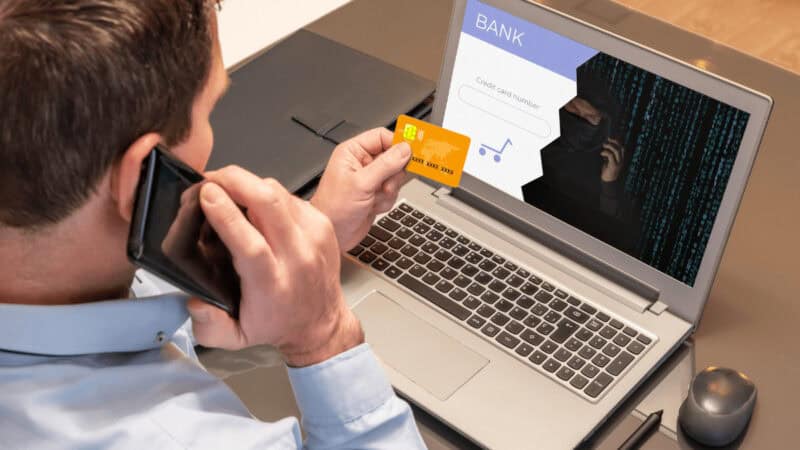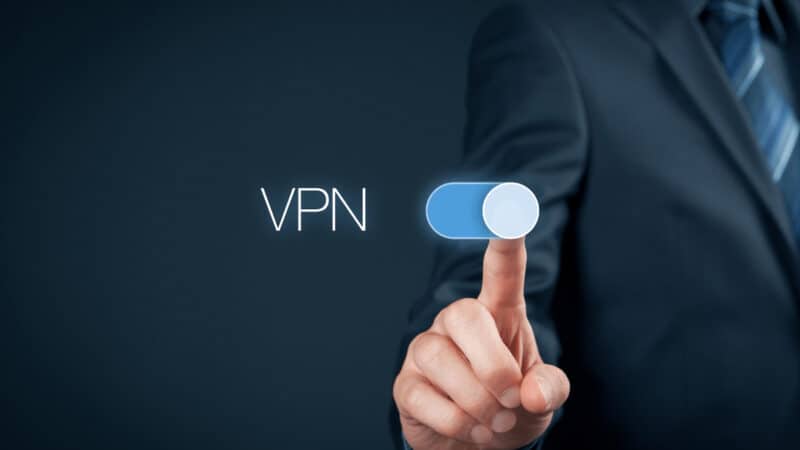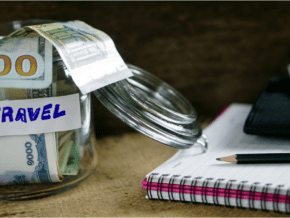The digital age has gifted us with the ability to book tickets, send large amounts of cash, and navigate new places with just the push of a button. However, this very same convenience has made us humans a little too dependent on technology, especially while traveling.
Studies have shown that the most common scams in 2023 involved phishing (37%), refund scams (37%), and trusted organizations (21%).
Realizing that someone's swindled you is stressful enough, but it's the next level when you're scammed online while traveling. You’re in an unfamiliar place with no connections.
That's why it's smart to learn how to deal with online fraud ahead of time. Nobody wants to be flying blind as a victim, not knowing what to do.
Let's go over the steps you can take to handle this scenario.
First Things First

Time is of the essence! The first few hours are critical for minimizing damage and protecting your personal information.
Here are the essential steps you'll need to take immediately.
1. Quickly Call the Bank
The first thing you need to do before anything else is to contact the bank or credit card company. You need to tell them the details of the scam that you had undergone and how it might reflect on your account.
Fortunately, banks usually have departments dedicated to cases of fraud. These departments can help you secure your account again and have the incident investigated.
The earlier you explain the scam to the bank, the more likely you are to stop the scammer before they create too much damage.
There are three things fraud specialists will help you do in response to an online scam:
- Freeze the account.
- Change the passwords.
- Increase security measures.
Getting your bank’s help is important. It will increase your chances of tracing the scammer’s steps, finding holes in security, and getting some of your money back.
ⓘ PRO TIP: Use a credit card instead of a debit card to make your purchases. Credit cards provide an extra layer of fraud protection, and many offer benefits like purchase insurance.
2. Bolster Your Logins
One of the first things you need to do after being scammed is to change your passwords. Do it for every single one of your accounts, beginning with any accounts related to your finances.
Next, you will need to enable two-factor authentication (2FA). This will add another layer of protection to your accounts.
Even if scammers manage to steal your password, 2FA can usually deter them from continuing their attempt to enter your account. In today’s day and age, passwords are no longer enough to keep cybercriminals out.
With the 2FA, you can ensure that your accounts cannot be accessed without you. This proactive security measure will help keep your personal and financial information safe, especially abroad.
After speaking with the bank, you should contact the local authorities to make a detailed report. They will want information about the scam in your current area, how you came across it, how it operated, and what you know about those behind it.
After contacting local authorities, here are additional steps you can take to help your case:
- Record every detail you can of the scam, such as messages, images, and voice recordings. Create a timeline by noting the date and time of each piece of evidence, especially the ones involving transactions.
- If you're scammed while traveling abroad, contact the embassy of your home country for help in going through the legal processes in the region for online scams.
- Report the scam to the online channel or platform it occurred on to keep them from operating there again. It also helps make cyberspace a safer place.
Your report can help track and combat cybercrime even if you aren't able to recover everything you lost.
Managing Your Losses

4. Stay with the Fraud Department
The work doesn’t end with contacting the bank. Afterward, you will have to work with the bank's Fraud Department to help them complete the investigation and undo unauthorized transactions.
This means giving all the evidence that you have and all the details that you know. The bank may even have a policy that takes care of some of your losses. Don't be afraid to follow up.
Be prepared for a bit of work, though. You'll have to fill out a separate form for each individual incident.
5. Review Your Insurance Coverage
Seasoned travelers understand the importance of travel insurance and always opt for it. This kind of thinking could really help you if you are scammed.
There’s a good chance that they might be able to cover some of the money that you lose to scams in other countries.
Also check with your insurance company and your credit card company because they sometimes offer coverage for travel losses.
6. Watch Your Finances
You need to keep an eye on your account afterward. It's essential to watch for any unusual activity that may occur in your account after the scam.
Any unauthorized transactions should immediately be reported to the bank. This will prevent the scammer from stealing even more money from you.
Concealing Your Personal Information
7. Guard Your Gadgets
Just because the scammer isn’t physically close to you doesn’t mean your hardware is safe from them.
Since 2023, studies show that one in four people who reported losing money to fraud said it started on social media. This means the scammer may have sent malware or spyware to your device.
This is why it’s important to do an anti-virus scan, change your passwords, and update your software. These actions will block more things that the scammer may use to worsen your situation.
Sometimes, you might be the one who inadvertently hands your personal information to scammers and other cybercriminals.
You need to be mindful of what you share online, especially on public wi-fi networks. Unless you are using a secure network, you should avoid accessing your sensitive accounts like those connected to your finances.
This applies to social media, too. A study showed that between January 2021 and June 2023, Americans lost $2.7 billion to scams originating on social media.
Take Preventive Measures in the Future

9. Get Educated
Your knowledge is the most important tool you can use to navigate cyberspace. To become truly safe, you must become truly knowledgeable on how the internet and those who use it operate.
This can begin with studying common online scams and where they are prevalent. You should learn about scammers’ tactics so you know how to counter them and avoid falling for their tricks.
10. Start Regularly Using Virtual Private Networks (VPNs)
It’s difficult to have access to a secure network when you’re on the move. By using a VPN for travel, you’ll be able to secure your connection no matter where you go. This will make you a more difficult target for scammers and other cybercriminals.
11. Protect Your Devices
When traveling, it’s best to make sure that all your devices have been locked and updated. Remember to ensure that they have reliable antivirus software installed. This way, you can avoid becoming the victim of an online scam while far from home.
12. Activate Alerts on Your Accounts
Did you know that banks can send you an alert when they detect unusual activity in your accounts? Make use of this feature while you travel so that you are protected from attempts by cybercriminals to access your accounts while abroad.
On a related note, one of the most important things to do before you leave is to to let your bank know you'll be traveling. Few things can ruin a trip faster than getting an alert that they've deactivated your card because they detected .
13. Only Book with Reputable Travel Companies
“If it sounds too good to be true, it probably is.” Use a healthy dose of skepticism when you see an amazing travel deal, and carefully research the company that's offering it.
It's safest to stick with companies you know and trust when you book your trip. Reputable companies have long-established trust and credibility, and they use robust security measures to protect your personal and financial information. They also offer excellent customer service, which can come in handy if there's a mixup along the way.
The travel companies we recommend on this travel blog have all been carefully vetted and are safe to use. Here are a few of our favorite affiliates:
- Flights: Expedia
- Accommodation: Booking, Agoda, Vrbo
- Rental cars: Discover Cars, RentalCars.com
- Guided tours: Viator, Get Your Guide, Take Walks
Inspired? Pin this post and share it with your friends!

Final thoughts about being scammed online
Last year, millions of travelers fell victim to online scams, losing precious vacation funds and valuable peace of mind. Don't let this happen to you.
By learning from the mistakes of others and taking the necessary precautions, you can ensure your trip is filled with unforgettable memories, not regretful encounters.
Remember, knowledge is power, and when it comes to online scams, the power to protect yourself is in your hands.



